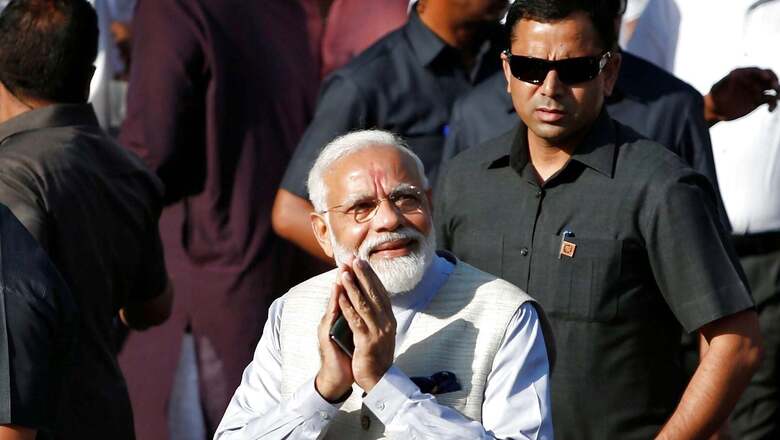
views
New Delhi: Beginning Gandhi Jayanti on October 2, the Narendra Modi government will undertake a month-long special campaign aimed at disposing pending public grievances, references from MPs and states, and also pending matters related to inter-ministerial consultations and parliamentary assurances.
According to a letter by cabinet secretary Rajiv Gauba to all secretaries of ministries and departments the campaign would be organised from October 2-31. Gauba’s letter, accessed by News18.com, stated that directions to this effect have been received from the PM.
“As you are well aware, timely and effective disposal of public grievances, references from Members of Parliament and State Governments, inter-ministerial consultations, Parliamentary assurances etc is an important part of the work of Ministries/Departments (sic),” Gauba wrote, adding that these issues sometimes do not receive the “desired attention”.
The Department of Administrative Reforms & Public Grievances (DARPG) will be the nodal ministry that would not only be responsible for monitoring the implementation of this campaign, but has also been charged with developing a dedicated dashboard for this purpose and issuing guidelines to the ministries.
The DARPG, under the Ministry of Personnel, Public Grievances and Pensions, is the nodal agency of the central government to bring about administrative reforms and address public grievances relating to central government agencies, and states.
Stating that the secretaries’ personal attention and leadership would be critical for the success of the campaign and that they will have to monitor its progress every day, Gauba’s letter said each ministry and department will have to appoint a nodal officer for the drive.
The ministries will have to send a weekly progress report to DARPG, which will draft a consolidated progress report.
Most ministries have already appointed their nodal officers for implementation of the campaign. News18.com spoke to three different ministries who said that work to identify the pending grievances, assurances and references were already underway.
What Leads to Pending Grievances, VIP References?
A senior government official told News18.com that faster disposal of public grievances, VIP references as well as parliamentary assurances will aid better governance and improve the delivery mechanism of the government.
“Pending public grievances in a department could be the result of duplication of grievances registered and certain grievances pertaining to other departments,” the official said, adding that targeted focus will speed up their disposal.
The official further said there could be 50 or more VIP references pending with a department at a given time depending on the size of a department. “Most of the MP references are related to transfer posting of officials and other administrative decisions, such as opening a school etc, in their constituencies. Since there are dedicated policies on these, accommodating these references or requests into the existing framework takes time,” the official said.
Another government official explained that, at times, assurances are given to Parliament regarding certain starred questions put up. “There can be many reasons why several assurances might get accumulated. For instance, in certain cases, the matter is sub-judice; in others, the data sought is with other agencies,” the official said.
The official added that many ministries periodically keep disposing grievances and as a result, do not have much pendency.
How Will the Campaign be Conducted?
Ahead of the launch of the special campaign, all ministries will undertake a drive from September 13- 29 to identify pending references from MPs, parliamentary assurances, and references received from states. As part of this drive, they will also have to identify pending public grievances, representations and references received as part of various inter-ministerial consultations.
In his letter, Gauba asked all ministries to take steps to dispose of identified pending references in a “meaningful manner”.
He said that during the course of such disposal, the ministries and departments should review the existing processes to reduce compliance burden and see to it that unnecessary paper work is done away with.
“In this regard, it may be recalled that during his Independence Day address this year, the Prime Minister has emphasised the need to review exiting rules and procedures on a continuing basis (sic),” Gauba’s letter stated.
The letter also underlined that instructions have been issued time and again for maintaining cleanliness in government offices, having a good work environment, to improve records management review and weeding out papers.
“During this special campaign, files of temporary nature may be identified and weeded out as per the extant instructions,” the letter said, adding that departments can also review record retention schedules to ensure that government files are neither prematurely destroyed nor kept for periods longer than necessary.
The letter further stated that scrap material and obsolete items should be discarded for greater cleanliness in ministries, most of which are housed in old government buildings
Read all the Latest News , Breaking News and Ukraine-Russia War Live Updates here.
















Comments
0 comment